News from the Indian Ocean Commission Biodiversity Project (EDF 10)
The €15 million programme for Coastal, Marine and Island Specific Biodiversity Management in the ESA-Ю aims to strengthen sustainable participatory management of coastal, marine and island specific biodiversity in Comoros, Madagascar, Mauritius, Seychelles, Kenya and Tanzania.*
Over the next three years the programme sets out to:
- Strengthen policies and frameworks promoting sustainable use of biodiversity.
- Enhance educational tools to manage biodiversity use and support decision makers.
- Improve networking and data exchange systems and statistics.
- Promote best practice and information sharing through thematic Biodiversity Centres.
- Contribute to sustainable economic development and sustainable livelihoods.
The programme is implemented by the Indian Ocean Commission. It complements other programmes in the region and fosters cooperation with the Secretariat of the Nairobi Convention, as a regional coordinating mechanism for the protection, management and development of the Marine and Coastal Environment of the Eastern African Region.
Under the EU’s decentralised management mode Landell Mills is engaged as the Technical Assistance Team to manage the Programme Management Unit and implement a number of Programme Estimates for the delivery of resources. Recent activities have included a workshop on marine invasive species and training on botanical database software.
BRAHMS training, 7-9 July
Sixteen herbarium and botanical gardens managers from Comoros, Kenya, Madagascar, Mauritius, Seychelles and Reunion Island, attended the training on BRAHMS (Botanical Research and Herbarium Management System), a software developed by Oxford University. The training took place at the University of Reunion from July 7-9. It was facilitated by trainers and botanists from the universities of Oxford, KwaZulu-Natal and Reunion Island. It proved to be a stimulating exercise for participants and trainers alike, fostering both professional camaraderie and momentum.
The creation of a network of Western Indian Ocean (WIO) herbaria and the goal of setting up a regional virtual herbarium presents an exciting opportunity for capacity building and knowledge transfer within the South West Indian Ocean region and beyond. The adoption of BRAHMS and the digitisation of herbarium specimens will improve the way individual herbaria are managed, simulate research and provide opportunities to exchange both data and ideas with BRAHMS users regionally and further afield.
BRAHMS Online will allow individual institutions to publish data online and make their herbaria visible to the wider botanical community, attracting both funding and researchers to their institutes. A pilot project that aims to digitise all orchid specimens will establish standards and workflows, and iron out any initial difficulties. The combined dataset will be an excellent tool to promote orchid conservation and will quickly produce results, including country checklists and field guides.
The first concrete outcome will be a field manual on orchids which is expected to be published early next year.
Workshop on marine invasive species: Mauritius, 28-30 July
Invasive alien species (IAS) are considered a major threat to biodiversity worldwide. Although terrestrial IAS have received considerable attention, little has been done in relation to marine invasive species (MIS) which pose a major threat to aquatic ecosystems, causing lasting damage.
It is against this backdrop that MIS specialists, Adnan Awad and Lynn Jackson, carried out a baseline study and developed draft proposals for activities on MIS, to be implemented during subsequent phases of the Biodiversity Project. The results of the baseline study and the proposals were presented at a workshop organised by the IOC, which was held at the Pearle Beach Hotel in Flic en Flac, Mauritius, between 28 - 30th July 2015. It was attended by representatives of the EU and Government of Mauritius, 38 technical representatives, resource persons, IOC staff and consultants. The resulting action plan will guide project interventions for the next four years.
* Reunion Island (France) participates in the programme on its own funds (notably from the European Regional Development Fund).


